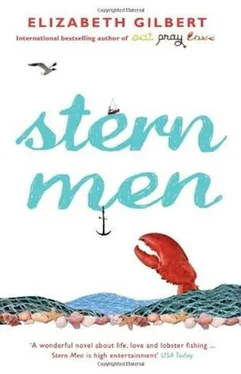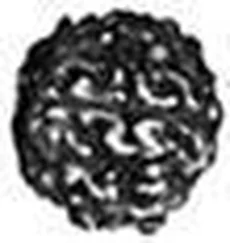Elizabeth Gilbert - Stern Men
Здесь есть возможность читать онлайн «Elizabeth Gilbert - Stern Men» весь текст электронной книги совершенно бесплатно (целиком полную версию без сокращений). В некоторых случаях можно слушать аудио, скачать через торрент в формате fb2 и присутствует краткое содержание. Жанр: Современная проза, на английском языке. Описание произведения, (предисловие) а так же отзывы посетителей доступны на портале библиотеки ЛибКат.
- Название:Stern Men
- Автор:
- Жанр:
- Год:неизвестен
- ISBN:нет данных
- Рейтинг книги:3 / 5. Голосов: 1
-
Избранное:Добавить в избранное
- Отзывы:
-
Ваша оценка:
- 60
- 1
- 2
- 3
- 4
- 5
Stern Men: краткое содержание, описание и аннотация
Предлагаем к чтению аннотацию, описание, краткое содержание или предисловие (зависит от того, что написал сам автор книги «Stern Men»). Если вы не нашли необходимую информацию о книге — напишите в комментариях, мы постараемся отыскать её.
Stern Men — читать онлайн бесплатно полную книгу (весь текст) целиком
Ниже представлен текст книги, разбитый по страницам. Система сохранения места последней прочитанной страницы, позволяет с удобством читать онлайн бесплатно книгу «Stern Men», без необходимости каждый раз заново искать на чём Вы остановились. Поставьте закладку, и сможете в любой момент перейти на страницу, на которой закончили чтение.
Интервал:
Закладка:
THE SECOND Courne Haven-Fort Niles lobster war took place between 1928 and 1930. It was a pathetic war, not worth discussing.
The third Courne Haven-Fort Niles lobster war was an ugly, short, four-month affair that raged in 1946 and had a greater effect on some islanders than the bombing of Pearl Harbor. This war prevented the island men from fishing in a year that saw the largest total catch of lobsters known in the fisheries of Maine: six thousand licensed fishermen took in a record nineteen million pounds of lobster that year. But the men on Fort Niles and Courne Haven missed the bounty because they were too busy fighting.
The fourth Courne Haven-Fort Niles lobster war began in the mid- 1950s. The cause of this war was not clearly defined. There was no single instigation, no one angry event that lit the fuse. So how did it begin? With pushing. With slow, typical, everyday pushing.
According to the laws of Maine, any man with a lobstering license may put a trap anywhere in Maine waters. That’s what the laws say. The reality is different. Certain families fish certain territories because they have always done so; certain areas belong to certain islands because they always have; certain waterways are under the control of certain people because they always have been. The ocean, though not marked by fences and deeds, is strictly marked by traditions, and it would serve a novice well to pay attention to those traditions.
The barriers, though invisible, are real, and they are constantly being tested. It is the nature of man to try to extend his property, and lobstermen are no exception. They push. They see what they can get away with. They shove and bump the boundaries whenever they can, trying to move each empire a foot here, a foot there.
Maybe Mr. Cobb has always stopped his line of traps at the mouth of a certain inlet. But what would happen if, one day, Mr. Cobb decided to set a few traps a few dozen feet farther in, to a spot where Mr. Thomas has traditionally fished? What harm could there be in a few dozen feet? Maybe the move would go unnoticed. Mr. Thomas isn’t as diligent as he once was, thinks Mr. Cobb. Perhaps Mr. Thomas has been ill or has had a bad year or has lost his wife and isn’t paying as close attention as he used to, and maybe-just maybe-the push will go unnoticed.
And it may. Mr. Thomas might not feel the crunch. Or, for whatever reasons, he may not care enough to challenge Mr. Cobb. Then again, maybe he will care. Maybe he’ll be immensely annoyed. Maybe Mr. Thomas will send a message of dissatisfaction. Maybe when Mr. Cobb goes to pull his traps the next week, he’ll find that Mr. Thomas has tied a half-hitch knot in the middle of each line, as a warning. Maybe Mr. Thomas and Mr. Cobb are neighbors who’ve never had any conflict in the past. Maybe they’re married to sisters. Maybe they’re good friends. Those harmless knots are Mr. Thomas’s way of saying, “I see what you’re trying to do here, friend, and I ask you to please back the hell out of my territory while I still have patience with you.”
And perhaps Mr. Cobb will back away, and that will be the end of it. Or perhaps he won’t. Who knows what reasons he may have for persisting? Perhaps Mr. Cobb is resentful that Mr. Thomas feels entitled to such a big piece of the ocean in the first place, when Mr. Thomas isn’t even that gifted a fisherman. And maybe Mr. Cobb is angry because of a rumor he heard that Mr. Thomas is keeping illegal short lobsters, or maybe Mr. Thomas’s son has looked in a lecherous manner at Mr. Cobb’s attractive thirteen-year-old daughter on more than one occasion. Perhaps Mr. Cobb has had troubles of his own at home and needs more money. Perhaps Mr. Cobb’s grandfather once laid claim to that same inlet, and Mr. Cobb is taking back what he believes rightfully belongs to his family.
So next week he sets his traps in Mr. Thomas’s territory again, only now he doesn’t think of it as Mr. Thomas’s territory but as free ocean and his own property as a free American man. And he’s a little pissed off, to tell you the truth, at that greedy bastard Thomas for tying knots in a man’s fishing lines, for Christ’s sake, when all a man is trying to do is make a goddamn living. What the hell was that supposed to mean, tying knots in his lines? If Mr. Thomas has a problem, why doesn’t he talk about it like a man? And by now Mr. Cobb doesn’t care if Mr. Thomas tries cutting his traps away, either. Let him cut! The hell with it! Let him try. He’ll clobber the bastard.
And when Mr. Thomas finds his neighbor’s pot buoys floating in his territory again, he has to make a choice. Cut the traps away? Mr. Thomas wonders how serious Cobb is. Who are Cobb’s friends and allies? Can Thomas afford to lose traps if Cobb retaliates by cutting them? Is it such great territory, after all? Worth fighting for? Did any Cobb ever have a legitimate claim to it? Is Cobb being malicious or is he ignorant?
There are so many reasons that can lead a man to set traps accidentally in another man’s area. Did these traps happen to drift there in a storm? Is Cobb a young hothead? Should a man protest every affront? Must a man be on constant guard against his neighbors? On the other hand, should a man sit in silence while some greedy bastard eats from his dinner plate, for Christ’s sake? Should a man be deprived of his means for making a living? What if Cobb decides to take over the whole area? What if Cobb pushes Thomas into someone else’s traps and causes more trouble for Thomas? Must a man spend hours of his every working day making such decisions?
In fact, he must.
If he is a lobsterman, he must make these decisions every day. It’s the way of the business. And over the years, a lobsterman develops a policy, a reputation. If he’s fishing for a living, fishing to feed his family, he cannot afford to be passive, and in time he’ll come to be known as either a pusher or a cutter. It’s hard to avoid becoming one or the other. He must fight to extend his territory by pushing another man’s trap line, or he must fight to defend his territory by cutting away the traps of anyone who pushes in on his.
Both pusher and cutter are derogatory terms. Nobody wants to be called either one, but nearly every lobsterman is one or the other. Or both. In general, pushers are young men, and cutters are older. Pushers have few traps in their fleet; cutters have many. Pushers have little to lose; cutters have everything to defend. The tension between pushers and cutters is constant, even within a single community, even within a single family.
On Fort Niles Island, Angus Addams was the most famous resident cutter. He cut away anybody and everybody who came near him, and he boasted about it. He said, of his cousins and neighbors, “They’ve been pushing my fanny around for fifty years, and I’ve cut away every last one of those bastards.” As a rule, Angus cut without warning. He didn’t waste time tying friendly warning knots in the lines of a fisherman who, ignorantly or accidentally, may have strayed into his domain. He didn’t care who the errant fisherman was or what his motives were. Angus Addams cut away with rage and consistency, cursing as he sawed through the wet, seaweed-slick rope, cursing those who were trying to take what was rightfully his. He was a good fisherman; he knew he was constantly being followed and watched by lesser men who wanted a piece of what he had. For the love of Christ, he wasn’t going to hand it to them.
Angus Addams had even cut away Ruth’s father, Stan Thomas, who was his best friend in the world. Stan Thomas was not much of a pusher, but he had once set traps past Jatty Rock, where the only buoys that ever bobbed were the yellow-and-green-striped buoys of Angus Addams. Stan observed that Angus hadn’t laid a trap there for months and thought he’d give it a try. He didn’t think Angus would notice. But Angus noticed. And Angus cut away every last trap in the line of his best friend, pulled up the severed red-and-blue Thomas buoys, tied them together with a yard of rope, and quit fishing for the day, he was so goddamn mad. He set out to find Stan Thomas. He motored all over the inlets and islands in and out of Worthy Channel until he saw the Miss Ruthie floating ahead, surrounded with seagulls greedy for the bait. Angus sped up to the boat. Stan Thomas stopped his work and looked over at his friend.
Читать дальшеИнтервал:
Закладка:
Похожие книги на «Stern Men»
Представляем Вашему вниманию похожие книги на «Stern Men» списком для выбора. Мы отобрали схожую по названию и смыслу литературу в надежде предоставить читателям больше вариантов отыскать новые, интересные, ещё непрочитанные произведения.
Обсуждение, отзывы о книге «Stern Men» и просто собственные мнения читателей. Оставьте ваши комментарии, напишите, что Вы думаете о произведении, его смысле или главных героях. Укажите что конкретно понравилось, а что нет, и почему Вы так считаете.









